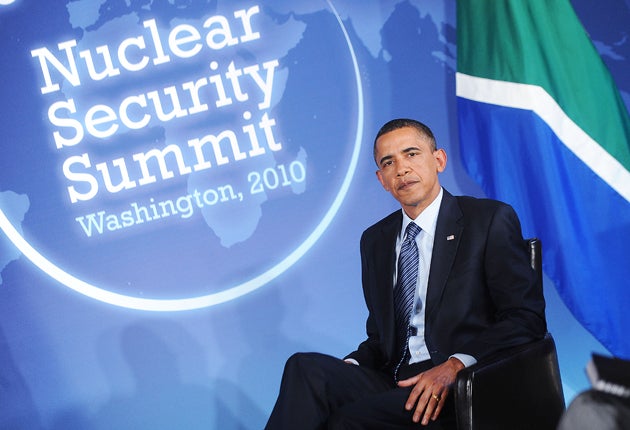President Barack Obama said yesterday that efforts by al-Qa'ida to acquire atomic weapons posed the biggest threat to global security, and world leaders meeting this week must act with urgency to combat this danger.
Obama, speaking on the eve of an unprecedented 47-nation summit in Washington aimed at thwarting nuclear terrorism, said he expected "enormous progress" at the conference toward the goal of locking down loose nuclear material worldwide.
"The central focus of this nuclear summit is the fact that the single biggest threat to US security - both short-term, medium-term and long-term - would be the possibility of a terrorist organization obtaining a nuclear weapon," Obama told reporters.
"We know that organizations like al-Qa'ida are in the process of trying to secure a nuclear weapon - a weapon of mass destruction that they have no compunction at using," Obama said before talks with South African President Jacob Zuma.
Nuclear non-proliferation experts say there are no known instances of terrorist groups obtaining highly enriched uranium or plutonium that could be used to make a crude nuclear bomb but note there have been 18 cases of nuclear material being stolen or going missing since the early 1990s.
"This is something that could change the security landscape of this country and around the world for years to come," Obama said, warning of the potential consequences if a nuclear bomb were detonated.
Obama's goal at the two-day summit is to get nations to agree to secure vulnerable nuclear material within four years and to take specific steps to crack down on nuclear smuggling.
The US president held talks yesterday with the prime ministers of nuclear-armed foes India and Pakistan, Kazakh President Nursultan Nazarbayev and South Africa's Zuma. He will see Chinese President Hu Jintao, Jordan's King Abdullah and the leaders of Malaysia, Ukraine and Armenia on Monday.
Signaling the US-led push for new sanctions on Iran is on leaders' minds even if not on the summit agenda, the White House said Obama told Zuma a "strong and unified international response" is required over Tehran's nuclear program.
The West wants further sanctions to deter Iran from what is seen as a covert nuclear weapons development drive, while Tehran says it has only peaceful nuclear ambitions.
Prime Minister Yusuf Raza Gilani "indicated his assurance that Pakistan takes nuclear security seriously and has appropriate safeguards in place," the White House said. It said Obama reasserted to Gilani "the importance of nuclear security, a priority he has reiterated for all countries."
Nuclear non-proliferation experts say Pakistan's nuclear arsenal and stockpile of weapons-grade nuclear material is heavily guarded but the threat from al-Qa'ida and the Taliban make the country one of the areas of greatest concern.
Pakistan is still trying to move out from the shadow cast by scientist Abdul Qadeer Khan, who was at the center of the world's biggest nuclear proliferation scandal in 2004. He has confessed to selling secrets to Iran, North Korea and Libya.
In his 50-minute meeting with Indian Prime Minister Manmohan Singh, Obama heard a litany of concerns about India's neighbor Pakistan, according to Indian Foreign Secretary Nirupama Rao, who briefed reporters.
Singh talked to Obama about the activities of Lashkar-e-Taiba, the Pakistan-based militant group responsible for the 2008 Mumbai attacks, "and also the fact that unfortunately there was no will on the part of the government of Pakistan to punish those responsible for the terrorist crimes in Mumbai," Rao said.
India and Pakistan have fought three wars since 1947 and several smaller conflicts, including one in 1999. Both nations conducted nuclear tests in 1998 and are not signatories to the Nuclear Non-Proliferation Treaty.
White House officials said Obama praised Kazakhstan's Nazarbayev as a model leader in their meeting for the steps he has taken to denuclearize his central Asian nation.
The former Soviet Union carried out nearly 500 atmospheric and underground nuclear test explosions in Kazakhstan between 1949 and 1989. Nazarbayev closed the testing site in 1991 and has disposed of more than 100 nuclear warheads.
The Kazakh government has erected posters around Washington ahead of the summit highlighting the country's decision to get rid of its nuclear arsenal, once the world's fourth largest.
White House officials said Obama would also meet Turkish Prime Minister Tayyip Erdogan on the sidelines of the summit. A US congressional committee last month voted to label the World War One-era massacres of Armenians by Turkish forces as genocide, angering Ankara and prompting it to recall its ambassador from Washington.
Subscribe to Independent Premium to bookmark this article
Want to bookmark your favourite articles and stories to read or reference later? Start your Independent Premium subscription today.


Join our commenting forum
Join thought-provoking conversations, follow other Independent readers and see their replies